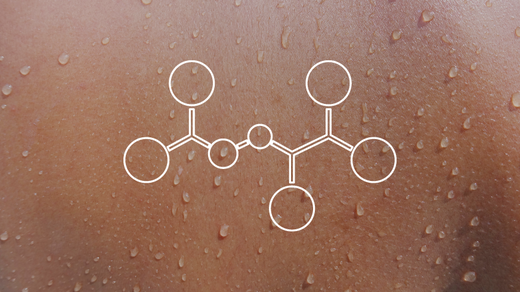Collageen is hot! In magazines en bij tv-commercials benadrukt men vooral de schoonheid gerelateerde eigenschappen van collageen, zoals een mooiere huid, haar en nagels. We merken dan ook dat er veel vraag is naar collageen als ‘beauty-supplement’.
Collageen doet alleen veel meer en is het beste te omschrijven als een bouwsteen voor je lichaam, bestaande uit verschillende aminozuren (eiwitten). Samen vormen deze aminozuren meerdere varianten van bindweefsel. Zo heb je collageen, type 1, 2 en 3, waarvan voor het merendeel huid, pezen, organen, vaten, kraakbeen en steunweefsel gemaakt wordt. Bindweefsel steunt, beschermt en verbindt organen, houdt het lichaam bij elkaar, isoleert en zorgt voor transport van stoffen (voeding en afvalstoffen tussen de cellen en het bloed). Het bestaat uit collagene, reticulaire en elastische vezels. Collageen is dus nodig voor de opbouw van collagene weefsels, welke bestaan uit trekvaste vezels. Doordat deze vezels niet te ver uitgerekt kunnen worden, blijft het lichaam in een bepaalde vorm.
Eiwitten als bouwsteen
Het is belangrijk om voldoende eiwitten binnen te krijgen om überhaupt collageen aan te kunnen maken, vooral glycine, arginine, lysine, valine en (iso)leucine. Daarnaast zijn vitamine C, MSM (een zwavelverbinding) en de mineralen molybdeen en selenium heel belangrijk als bouwstoffen, om de aanmaak van collageen te ondersteunen. Ook hyaluronzuur is nodig als bouwsteen van specifiek bindweefsel, zoals in het oog.
Collageen biedt dus stevigheid van en tussen de weefsels en zorgt voor flexibiliteit. Zonder collageen zou je bindweefsel net als gelei zijn. De productie van collageen neemt na je 25e jaar steeds wat af. Vanaf je 40e jaar neemt de elasticiteit duidelijk af. En dan komt er een moment dat je het aan je huid gaat merken. Deze wordt wat slapper en er ontstaan kleine en later ook grotere rimpeltjes. Vaak is dat het moment dat men aan collageen als supplement gaat denken want dat zou dan de oplossing tegen rimpels moeten zijn, als je de reclames mag geloven. Het klopt dat haren en nagels collageen nodig hebben en dat collageen helpt de huidveroudering tegen te gaan en de elasticiteit ervan te behouden. Maar wat veel belangrijker is voor een gezond werkend lichaam, is het collageen dat van binnen in het lichaam nodig is.
Hiërarchie
Het lichaam werkt dan ook volgens een bepaalde hiërarchie. Het kan bijvoorbeeld zo zijn dat twee personen collageen gaan gebruiken voor een mooiere en stevigere huid. Bij de een is er na een maand of twee al verschil te zien in de spiegel, terwijl de ander na drie maanden nog steeds geen verschil ziet. Hoe kan dit dan? Ten eerste zijn we allemaal anders, dat is een inkoppertje, en ten tweede bepaalt het lichaam waar het collageen het hardste nodig is op dat moment. Is dat om je pezen te verstevigen of heeft diegene een flinke griep gehad waardoor er spieren zijn afgebroken, dan gebruikt dat lijf het collageen om daar te repareren en niet om minder rimpels te krijgen. Evolutionair zijn spieren, bloedvaten en pezen van goede kwaliteit nou net even belangrijker om te overleven, dan een mooi uiterlijk. Een intacte huid is daarentegen wél heel belangrijk voor de gezondheid omdat deze, samen met de slijmvliezen, de belangrijkste barrière vormt tussen de buiten- en de binnenwereld. Zo beschermt de huid ons tegen micro-organismen en belastende stoffen van buitenaf, die we niet in de bloedbaan willen krijgen.
Orgaan
De huid is een groot orgaan wat bij elkaar meer weegt dan welk menselijk ander orgaan dan ook. Het geeft een goede afspiegeling van de interne gezondheid en heeft diverse functies. Zintuigelijke prikkels zoals druk, waaronder aanraking, en temperatuur worden door de huid gecommuniceerd naar de hersenen, welke daarna het lichaam de opdracht geven hoe hiermee om te gaan. De verschillende huidlagen hebben een functie in de water- en zoutenhuishouding. Verder wordt de huid ook weleens de derde nier genoemd omdat je via de huid kunt ontgiften, door middel van zweet. En niet geheel onbelangrijk, de huid zorgt ervoor dat de hele boel bij elkaar gehouden wordt, als een mooi pakketje.
Als er binnenin het lichaam processen niet in balans zijn, kun je de uitwerking daarvan zien aan de huid. Een voedselallergie bijvoorbeeld kan een onrustige huid of eczeem veroorzaken. Als de hormonen uit balans zijn, zie je sneller acne of roodheid van de huid. Maar ook stress, antibioticagebruik, slechte darmflora, roken, bewerkte en ongezonde voeding en te veel vrije radicalen hebben bijvoorbeeld een negatief effect op de huid. Vaak helpt het al om de voeding aan te passen en bijvoorbeeld zuivel of gluten weg te laten.
Voorgenoemde factoren beïnvloeden naast veroudering de kwaliteit van de huid en daarom is collageengebruik, als in een supplement, niet de enige vereiste voor het verbeteren van de huid. Het supplement werkt goed als er een tekort is aan collageen. Daarnaast werkt het mee om toxines uit cosmetica en sigaretten te vermijden, veel groenten te eten en genoeg water te drinken, de darmflora gezond te houden en genoeg te ontspannen. Als het specifiek om de huid gaat, is Biotine (vitamine B8) een belangrijke vitamine. Daarnaast spelen omega 3 en zink een grote rol voor de huid, denk aan wondheling en vernieuwing.








